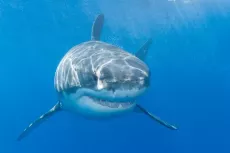Mexico enhances vaquita protection
The world's most endangered marine mammal gets more assistance from the Mexican government.
The Mexican government has announced the successful conclusion of a project involving the placement of 193 cement blocks on the sea floor in strategic locations in the vaquita’s habitat.
Called the Concrete Block Planting project, the objective was to discourage the setting of gillnets within the Zero Tolerance Area, where the remaining vaquita population is localised. Large steel hooks protrude from the top of the blocks, trapping any gillnets they come into contact with.
In early October, after nearly three months, the 193rd block was finally placed on the sea bed.
With the blocks in place, the Mexican Navy are working with Sea Shepherd to detect any fishing gear and deter illegal fishing.
The Sea Shepherd crew on board the Farley Mowat is currently in the Vaquita Refuge monitoring the waters using specialised sonar.
If the crew find any entangled nets in the hooks, they will inform the Mexican Navy. Then, together with Mexican NGO Museo de Ballena, the crew will remove the nets and release any animals trapped inside.
They will also notify the Mexican Navy if they come across illegal fishing activities in the Zero Tolerance Area. The Mexican Navy would then despatch an interceptor to get the fishermen to remove their nets and leave.
“We are thrilled that our relationship with the Government of Mexico has reached a level of respect and coordination that Sea Shepherd is invited to the table as we partner together and evolve our strategies to protect the vaquita,” said Pritam Singh, Chairman of the Board for Sea Shepherd Conservation Society.
The vaquita is the smallest cetacean and the most endangered marine mammal in the world, with less than 20 individuals believed to be alive today. They are found only in the Upper Gulf of California in Mexico, within an area known as the Vaquita Refuge.















































